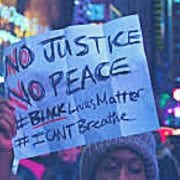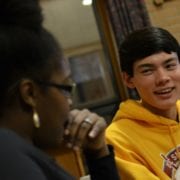Have We Become Blind?
BY JAMES PAUL GUMATAOTAO | September 26, 2022
Sunday’s Readings
Last week, leaders of the Pacific Islands met to prepare for a summit with President Biden. The leaders discussed their goals, one of which is addressing the growing threat of climate change on their island homes. They hope that President Biden will embrace their goals and priorities. Calling Guam home makes this issue all the more pertinent, especially as we end the Season of Creation.
A theme weaved throughout today’s readings is: how does our relationship with power and wealth inform our relationship with others and God? Amos’ woe-cry strictly focuses on the lifestyle of the elite in Israel during this time, which fits into the book’s primary concern of social justice. Theologian Carol Dempsey points out that while the text may not name the economic status of the people, one can presume that the prophet is addressing the wealthy upper class of Israel, whose complacency and self-indulgence have perpetuated violence.

On the other hand, Paul urges Timothy to fulfill the responsibilities that he was entrusted with at the laying on of hands. The scholar Terence Keegan explains that those responsibilities involve not just teaching but providing moral leadership by being a good example. The Psalm and Gospel both highlight God’s attentiveness to those most vulnerable in our society. One scholar of the text, Michael Patella, writes that the ignorance and obliviousness of the rich man is an example of how power and wealth can blind us to the reign of God. Patella goes on to say that the rich man needed Lazarus to be saved. Had the rich man been attentive to the human person eating the scraps, more than the luxuries of his life, the ending would be quite different.
Like the rich man and the elite class in Israel, it is easy to become blind to the needs and concerns of those not sitting at the table—or those roughly 5,974 miles off the coast of California. Our readings remind us that we must not become blind to the reign of God; rather, we have a responsibility to teach and lead by example. Pope Francis in Laudato Si’ urges us to broaden our vision using our freedom to direct the advances of our time, putting it “at the service of another type of progress, one which is healthier, more human, more social, more integral.” Let us attend to and embrace the goals and concerns of those most vulnerable. Our embrace acknowledges what the rich man failed to see, that we need the other. Pope Francis suggests that not only do we need each other, but “everything is interconnected.” So as the Season of Creation comes to a close, let us come together to model what it takes to be responsible for “this home which has been entrusted to us.”
For Reflection:
- How have you become blind to the reign of God?
- What have you done to teach and model responsibility?
James Paul Gumataotao is a theology teacher and campus minister at Cristo Rey Boston. A native son of Guam, he studied theology and education at the University of Portland, and is a graduate of the School of Theology and Ministry at Boston College. Prior to moving to Boston, he taught in Fairbanks, AK as a high school teacher.











God dwells in each of us and children recognise that and treat everyone as equal. Those that are often ignored in our society know that their reason of being is that they are nice, loving people, and they challenge us to accept their shadow side, which merely reflects our own shadow darker side to be embraced with love.
Rich and Poor are two sides of the same coin. Indeed “everything is interconnected”.
To teach and model responsibility I constantly think about how this can be done. When students see me as a teacher, I need to show them that at the core of my life is my relationship with the Father, Son and Holy Spirit. This doesn’t happen if I chose to do so only when it is convenient. It needs to be the core of my existence. Being rich has never been a factor in my life but being good has. If students see that my choices are for goodness, kindness, equity – they see those values brought forth. I made a decision when my sons were in college to pay off their bills from college, I wanted them to start the job with no reason to do something except make a moral decision for the good. Without that first monies being given there might have been certain effects but with that burden lifted, they could learn that moral responsibility on their first job. Life is filled with the same kinds of decisions that Lazarus incurred in regard to the rich man. This week we ask God to help us model those decisions that will assist the kingdom of God on earth.